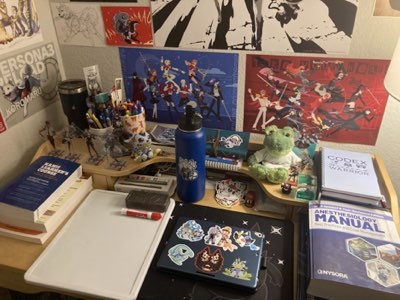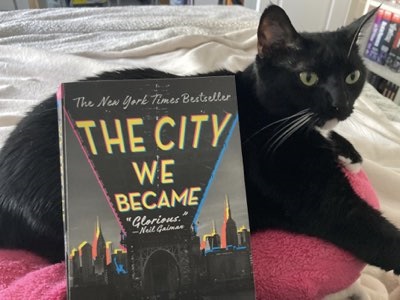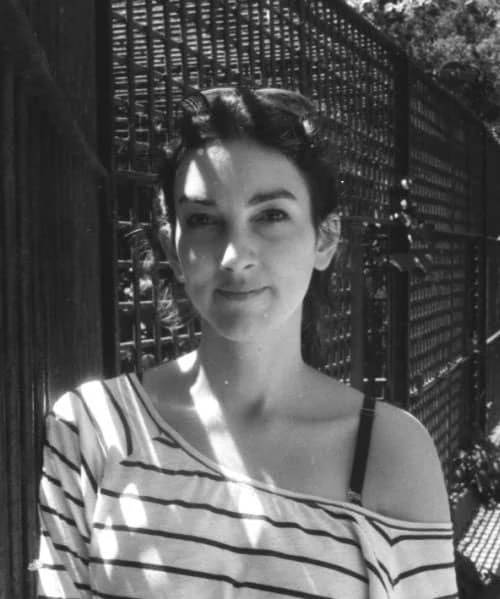
In “A Ten Thousand Year Survey Into Seven Stomachs of an Ishta,” Ronit, a mercenary for hire, takes on a high-paying job from their client Long Telomere Corp. Her task is to investigate the gastrointestinal frontiers of the Ishta, a giant mouth that has existed for around ten thousand years and which no previous explorers have come back from. She hopes that, equipped with her special biofilm suit and supported by a mind-reading worm, she will be the first to reach its stomach and bring back scientific discoveries that will make her name known across the universe. But the alien’s stomach holds secrets that she could never have dreamed of.
Author Allison Thai is a second-generation Vietnamese-American and the eldest child of Vietnam War refugees. By day she puts humans to sleep for surgery, by night she moonlights as a devourer of words and video games.
Marissa van Uden: Thanks for joining us, Allison! Right from the first page, this story sets up an incredible image, with the Ishta’s ancient mouth stretched open and steaming like some kind of geologic formation. How did the idea for this alien creature come to you—did you start with that visual of the mouth or with the whole concept, or something else?
Allison Thai: Thank you very much for having me. It’s an honor to make my Apex debut!
For as long as I can remember, I’ve been terrified of the idea of being eaten alive, or being swallowed whole to end up in the belly of some great beast. I visualized the alien as a mouth first, then the stomach, then split the stomach into seven of them, and spent a lot of time figuring out the structures, contents, and functions. The terror of the idea has been around for years, but my inexperience with writing horror held me back for a while.
Stephen Graham Jones, one of my favorite horror authors, had given my Clarion West cohort a guest talk in 2023, and I asked him about his approach to writing effective horror (his wheelhouse, but something outside my comfort zone). His answer: “Infect readers with your horror. Show them what you’re scared of, not what you think people would be scared of. Show something the character loves and values, and take it away. Or show something the character fears, and make that fear come true.”
His words were a lesson I really took to heart and tried to execute in this story. Ronit thrives on freedom and independence, being in charge of her own life, but ends up a helpless rooted prisoner who was never really in charge the moment she accepted the Ishta mission. She wants to be remembered and respected, but ends up twisting into something else, and after ten thousand years, no one will remember her. The Ishta she stepped into must’ve been someone else once, with a past name and life, but that knowledge has been swept away by the sands of time. On the other hand, with the survey, she could be marked down for posterity, just definitely not in the way she wants. She steps into a circle of Hell and comes out becoming her own idea of Hell. (Dante reference; more on that in another question!)
MVU: That’s fantastic advice from Stephen Graham Jones. I can totally see it at play here. Once the story was written, how did it evolve from there? Did you take it through many iterations, and were there any details that surprised you during the writing?
AT: The physical process of putting the story onto paper took about a week, since it was during the six-week Clarion West workshop and five out of those six weeks consisted of writing a new short story. As mentioned earlier, the idea and image of an explorer wandering through the innards of a giant beast had been percolating for years, but the workshop environment gave me the right impetus to actually shape that idea into a story. Invaluable feedback from my classmates, and from our instructor that week, NK Jemisin, really helped me figure out what to tackle during the revision process. This is the bleakest, most twisted story I’ve written so far, and I certainly surprised myself while writing with how dark I could get. I also surprised myself with how quickly I could get that story done (and somehow not make it an unreadable mess for Nora and my classmates). I usually work much, much slower. That test of how far I could push my productivity gave me a real confidence boost.
Speaking of details, I have to mention the one I think that really helped round and flesh out Ronit as a character: her “baby picture” used to advertise her family’s kosher store. At the time of writing the story, I was in Kansas City. I was strolling through the Historic City Market to get lunch when these signs really caught my eye.

I like to be open to unexpected bits of inspiration like this, which I throw into stories to try spicing them up.
I had never seen signs like it; I imagine that some potential customers are drawn to the place just because of the unusual image. I wondered what that girl thinks of being featured on signs like that. I wondered if she absolutely hated it. That train of thought led to the eureka moment I had to incorporate the image into Ronit’s identity. This bit of her past was not included in my first draft. I added it during revision. The last-minute addition meshed well with what I had already established for her roots and personality. I used the cute baby picture as a thorn in her side, something that undermines the hardened badass reputation she had built for herself. It’s a source of her deep-seated fears of losing agency and control, a visual of the past that repeats itself in the future.
MVU: This is the kind of background detail I love to learn about writer’s creative process. It’s so fascinating how every different author observes what’s around them and pulls ideas together for their work. I was impressed by how much of a world—complete with cultures, a long history, and a unique ecosystem—you were able to get across in this short piece, and all of it so naturally and seamlessly woven into the events of the story. Have you written anything else in this world, or do you think you might explore it some more in the future?
AT: I have always loved learning about biology and about other cultures. I jumped at the opportunity to intimately intertwine them within the space of a short story. I’m particularly fascinated with parasitology and symbiotic relationships, and that shows in how I wrote about Ronit and the worm Blik, the Ishta and the Mirzhaks living deep inside.
I had written the story intending for it to be standalone. Initially I had no plans to expand on the universe beyond the horrors surrounding the Ishta and its inhabitants/worshippers, the Mirzhaks. I did, however, entertain the idea of writing a story for Ronit’s son, who she barely mentions in passing, but it did make me wonder about his perspective and upbringing, what he thought of a mercenary mother who just saw him as a means to an end. I’m always thinking about what other people are thinking, and that has served as a wellspring for more stories.
MVU: I love that idea! Do you usually let a story idea percolate for a while before you start writing it, or do you prefer to discover it on the page?
AT: Definitely the former. I like to write stories the way I cook curry: I like to let it percolate, simmer, and stew for a good long while. Generally I don’t start writing until I know how the story ends. I’m very much a planner; I like to organize and research and outline, sometimes to a fault. I don’t understand how pantsers function. I think my brain would combust trying to write by the seat of my pants. That being said, I do let myself open up to inspiring developments that I think could enhance the story in some way. (Like that sign of Cristina’s Produce!)
MVU: What does a typical writing day look like to you?
AT: I work ten hours almost every day at the hospital, so the only and best time for me to write on workdays are in the evenings. On days off and weekends, I take advantage of getting used to waking up at the crack of dawn to squeeze in some writing before doing other activities. I’m constantly brainstorming, constantly playing out scenes in my head. I’m visually oriented and I grew up reading Western and Japanese comics, so I imagine the flow of scenes, certain shots and vantage points, like comic panels. I hate even the act of scratching out things in a notebook, so I use a whiteboard to work through elements of a story before actually drafting on Scrivener.

My desk designated for writing and studying. Not pictured: my angled art desk just to the right, a cat bed below the study desk for any of my two fur babies, Morag and Brighid, to curl up at my feet while I work.

My typical reading view. Morag insists on propping up whatever book I’m reading and warming my lap almost every time.
MVU: I really loved your story in Podcastle, “Caring For Dragons and Growing a Flower.” In it, Cương is assigned to care for the fighter dragons of the People’s Army of Vietnam, far away from his family and forced to conform to political ideals that are not his own. His understanding and friendship with the dragons is told in epistolary form, in coded letters swapped between himself and his wife. The writing is beautiful with vivid imagery and so many layers. For example, “When the dragons lie still, I can see the sky caught in the globes of their eyes. Clouds swim like white koi in the ponds of their tears. When you’re privileged to be on their side, up close, you can appreciate that beauty. The enemy can only see monsters.” Everything takes on new meaning by the end, so this is a story to read twice. I saw that you dedicated it your father and grandfather. Are you able to share a bit about what this story means to you, and the inspiration behind it?
AT: I’m so happy and honored that you went out of your way to read and enjoy this story. It has a very special place in my heart. Already in the planning and writing stages, it was a story that’s deeply personal and related to my family’s legacy. I was privileged to be born and raised in the United States, but my parents and grandparents endured horrors during the aftermath of the Vietnam War and the triumph of the communist regime. I dedicated the story to my grandfather because he is the basis and inspiration for Cuong, the male protagonist. Both were soldiers who lost their lives during the war and never made it over to the States. I had never met my grandfather, so everything I know about him is from my mom. She told me that he worked as a medic and used to write short stories, all of which are unpublished and lost with him in the chaos of war. I followed his footsteps into the medical field, and I guess that from him I inherited my itch to write.
I dedicated the story to my dad after his death. At the start of 2020, he suddenly passed away from a hemorrhagic stroke. I read this story to my unconscious, vent-assisted dad in neuro ICU, in the last few days of his life. Podcastle accepted the story on the morning my dad passed away. The email came just a few hours after I got the news about Dad from my mom. This is the same story I had submitted to Clarion West and Clarion UCSD, and got me admitted to both workshops later in 2020. Perhaps there will be more milestones to achieve in my writing career, but I don’t think anything else will top those incredibly special moments and victories I had with this little Vietnam War story.
MVU: Oh, I am so glad you were able to read this to your dad. What a beautiful gift to give him, and your grandfather too. There is so much loss and so much love behind this story, and so much power in it going forward—it really is a special milestone piece. Thank you so much for sharing this personal family story behind it.
When did you know you wanted to be a writer, and what works, artists, or personal mentors from your early years still inspire you to this day?
AT: In elementary and middle school, I was the oddball lonely kid without many friends. I turned to books for comfort, and the Redwall series by Brian Jacques was my gateway to a lifelong love of reading and writing. I eagerly devoured all those tales of talking animals embarking on epic adventures, solving riddles, and defeating villainous vermin. Reading those books as a kid, being totally sucked into and invested in that world, made me think “I want to write stories like that.”
Later in my college years I encountered and extensively studied the works of Dante and Ovid, particularly Inferno and Metamorphoses. I really love how they play with and explore symbolism and imagery. They’ve been huge influences throughout my speculative work. This story is no exception. I wrote it with Inferno’s third circle of Hell in mind, with the circle of gluttony manifested as seven stomachs of an alien. Rather than the stomach being this indiscriminate acid-filled incinerator, I wanted to portray a kind of infernal hierarchy and structure to the Ishta, like how Dante constructs circles within circles in his concept of Hell. Ovidean influence is at play, too. A running theme throughout Ovid’s Metamorphoses is the fact when characters transform, they often lose their voice and are left unable to speak. Losing one’s voice means losing one’s agency. Despite the far-future sci-fi setting, what happens to Ronit isn’t a far cry from what happens to the Hell-punished and transformed victims portrayed by Dante and Ovid.
Since I started writing speculative short fiction in 2017, one of my top writing goals is to write and publish a short story for each circle of Dante’s Hell, maybe even compile them in a collection. As of this interview, I’ve checked off three out of nine (violence, fraud, gluttony).
MVU: That is a truly fantastic goal. I really hope we get to see this collection one day.
I love to hear about what causes writers are most passionate about. Do you have a favorite charity or cause you’d like to mention here, for readers to check out and support if they can?
AT: I donate to and regularly volunteer at my local cat rescue shelter, Wild Blue Cats. WBC rescues and cares for cats that other shelters don’t have the means to handle. Many of these cats have health conditions, so my volunteer work consists of giving them their scheduled medications and just TLC. I always encourage people to donate to their local charities if they don’t know or trust who to give their time and money to.
I’m also passionate about and very much enjoy teaching English to adult immigrants living in the United States. I don’t need to fling myself to some faraway country to teach English. There are people right here at home, some of my own family included, who really need the English-speaking skills to survive and thrive. So I also like to encourage people, especially my fellow writers, to reach out to their local programs that hold English classes for adults and need teachers.
MVU: That is brilliant advice, and I love both of these causes. Thank you so much for sharing so much about your creative life with us today! Before we go, do you have any upcoming publications to boost here, or are you working on any exciting new projects?
AT: And thank you for providing these wonderful questions!
Against my better judgment, I’m currently juggling three novels, all in the drawing board process, but here is the one that has the most cohesive premise so far: High in the clouds is a sliver of civilization splintered from the mainland, hewn from the severed antler of a deer god, and borne aloft by the power of seven bird gods. In this land, and with the hired help of a surly mercenary (yes maybe you’ve noticed I take a liking to mercenary characters), a nonverbal autistic woman studies, encounters, and negotiates with ghosts to harness their vapors for medicinal use. She becomes the first to discover and introduce anesthesia in a Victorian-like era. I’ll definitely be pulling from my background as an anesthetist to craft the science-fantasy worldbuilding, and from my own lived experience as an autistic woman to portray this protagonist. Tentative title: Ghost Tenet.
Finally, this is me tooting the editor horn: in spring 2025, submissions open for Plott Hound Magazine: a new e-zine of speculative fiction focused on and starring animals. Professional-rate payment is offered for original short fiction, flash fiction, poetry, and essays. Translations into English and submissions from underrepresented groups (BIPOC, queer, disabled, etc.) highly encouraged!
MVU: I can’t figure out which of these I love more. I will absolutely be keeping my eye out for both!












